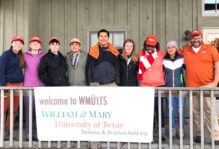A taste of blood
A week or so ago, I interviewed Oliver Kerscher about his work with yeast genetics. I am working on a story about his lab’s examination of the biomechanics of yeast DNA and its relationship with understanding of cancer and other diseases in humans.
To do the interview, I went directly to Oliver’s lab, one of several new biology labs on the top floor of the Integrated Science Center. One of his students, Caitlin Cooke, escorted me from the lab to Oliver’s office. She said that all the signs in the building aren’t up yet, and they wanted to spare me the trouble of wandering around the office suites, peering in each one as I looked for Oliver.
During the course of our interview, Oliver and I got to talking about Caitlin and the other William & Mary students working in his lab and about student researchers in general. We spoke in particular about the personality traits required for a life in the lab, among which is an imperviousness to disappointment, or at least an ability to be philosophical when you end up with a null result or down a blind alley after spending hours and hours and days and days working on a project.
The other side of that coin is the stimulating and near-addictive quality that comes from success. Researchers that achieve a goal, even an intermediate one, can get enough energy from the experience to carry them through the next set of repetitive studies.
Oliver referred to it as “a taste of blood,” then immediately winced, as if his metaphor was too graphic. The tape recorder was running, after all. But I knew exactly what he meant: Nothing is as encouraging to a young researcher as the flavor of his or own success.
Years ago, before I came to William and Mary, I interviewed Paul Berg, the winner of the 1980 Nobel Prize for his work in recombinant DNA science. He and I got to talking about young researchers and the heady effects of success.
“I’m often trying to encourage research people in my lab,” Berg told me. “I’ve developed different tricks. One of my favorites is to discuss an experiment with them and to bet on the outcome. I often take what I’m reasonably convinced will be the losing side. If the experiment goes well, I get to pay off. The researcher gets a little boost.”





No comments.
Comments are currently closed. Comments are closed on all posts older than one year, and for those in our archive.